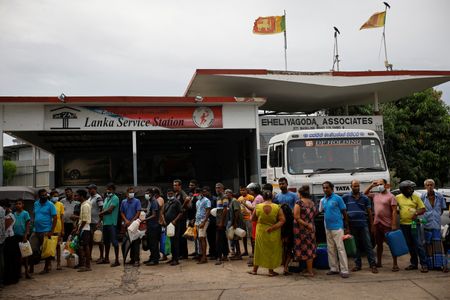
Sri Lanka parliament blocks move to condemn president, lawmakers arrested over violence

By Uditha Jayasinghe and Alasdair Pal
COLOMBO (Reuters) -Sri Lanka’s parliament on Tuesday voted against fast-tracking an opposition move to condemn President Gotabaya Rajapaksa, as the prime minister warned that the country was in a precarious economic situation and down to its last day of petrol supplies.
Lawmakers voted 119 to 68 against fast-tracking the largely symbolic motion through parliament, which reconvened for the first time since violence flared last week and the prime minister quit. It is likely to be debated later in the week.
If the motion eventually passes, it could increase the pressure on the president to resign, following his brother Mahinda Rajapaksa who stood down as prime minister in response to the economic crisis that has triggered violent protests.
Ranil Wickremesinghe, the new prime minister, said in a televised address on Monday that the island nation had to face “unpleasant and terrifying facts”.
“At the moment, we only have petrol stocks for a single day. The next couple of months will be the most difficult ones of our lives,” he said.
Foreign reserves had come close to zero from $7.5 billion in November 2019, he added, with the country requiring $75 million in the next few days to keep the economy running. Essential medicines had run out.
Power cuts could extend to as much as 15 hours a day because of the lack of fuel, which is mostly imported.
Wickremesinghe said he planned to ask for foreign assistance, privatise SriLankan Airlines and seek parliamentary approval to increase Treasury bill issuance to 4 trillion rupees ($11.27 billion) from 3 trillion.
“For a short period, our future will be even more difficult than the tough times that we have passed,” he said.
LAWMAKERS ARRESTED
More than a month of predominantly peaceful protests against the government’s handling of the economy turned deadly last week when supporters of former the former prime minister stormed an anti-government protest site in the commercial capital, Colombo.
Days of subsequent clashes between protesters, government supporters and police left nine dead and more than 300 injured.
Mahinda Rajapaksa then resigned, leaving Gotabaya, his younger brother, to rule on as president.
Police said on Tuesday they had arrested two lawmakers from the Rajapaksas’ Sri Lanka Podujana Peramuna in connection with last week’s violence.
Sri Lanka’s economic crisis, unparalleled since its independence in 1948, has come from the confluence of the COVID-19 pandemic, rising oil prices and populist tax cuts by the Rajapaksas.
The chronic foreign exchange shortage has led to rampant inflation and shortages of medicine, fuel and other essentials, bringing thousands out on the streets in protest in the Indian Ocean nation, where China and India are battling for influence.
Wickremesinghe’s four cabinet appointments to date have all been from the Rajapaksas’ party, to the dismay of protesters, who want to exile the family from the nation’s politics.
He is yet to announce key portfolios including the crucial post of finance minister, who will negotiate with the International Monetary Fund for financial help.
Former Finance Minister Ali Sabry had held preliminary talks with the multilateral lender, but he quit along with Mahinda Rajapaksa last week.
($1 = 355.0000 Sri Lankan rupees)
(Reporting by Alasdair Pal and Uditha Jayasinghe in Colombo; Editing by Raju Gopalakrishnan and Alison Williams)

















POST COMMENTS (0)